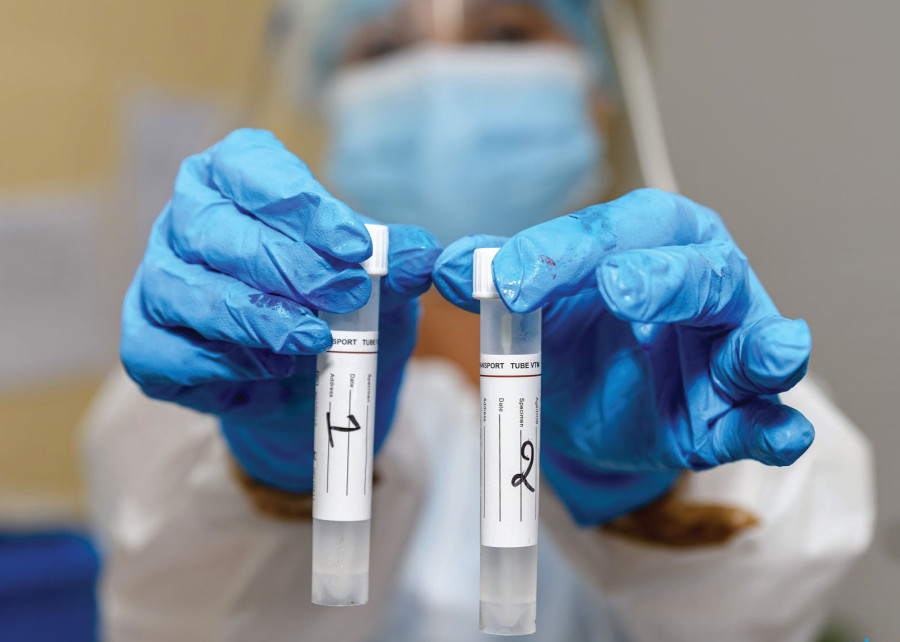National
No JN.1 strain found in Nepal yet
The World Health Organisation asks countries to scale up surveillance and protective measures.
Arjun Poudel
None of the swab samples of people infected with coronavirus in November in Nepal tested positive for JN.1, a new sub-variant of the coronavirus that is spreading in India, the National Public Health Laboratory, which carried out a whole-genome sequencing on the swab samples, has said.
“Results of gene sequencing of those samples show Omicron’s sub-variants such as XBB.1.16, EG 5.1 and XBB.2.3 that were circulating in November,” said Dr Ranjan Bhatta, director at the laboratory. “The result was obvious, as the new sub-variant JN.1 is just circulating in India.”
Whole-genome sequencing is a comprehensive method of analysing the entire DNA sequence of an organism’s genes. Researchers believe that whole-genome sequencing of coronavirus could be instrumental in tracking the severity and properties of the virus.
Officials said that gene sequencing was carried out on swab samples of 12 people infected with coronavirus. The swab samples were collected from point of entry and provincial health laboratories.
India has been witnessing a surge in new cases of Covid-19 and has also confirmed an outbreak of JN.1 sub-variant. At least four people died and 752 new cases were detected on Saturday, according to media reports.
The JN.1 sub-variant, first detected in September in the United States, is a descendant of BA.2.86, which is a highly mutated variant of the Omicron strain of Covid-19.
Experts in Nepal have urged the authorities to step up vigilance as they said that any virus variant or disease seen in any corner of the globe could enter the country due to the global movement of people.
Health officials say they are closely following developments in the southern neighbour.
They say even if the country has not seen a new surge of coronavirus cases, surveillance measures, including testing and gene sequencing, will be stepped up in the coming days.
“We have alerted the health desks set up at the international land crossings and provincial public health laboratories to send swab samples of infected persons for gene sequencing,” said Bhatta. “Gene sequencing will be carried out once we get 24 positive samples.”
The Ministry of Health and Population has asked vulnerable groups to get the Covid-19 vaccine. Pregnant women, those having compromised immunity, people suffering from chronic diseases and those above 55 years of age have been designated vulnerable groups for vaccination, officials said.
Several countries, including China, Indonesia, the Philippines, Malaysia and Singapore, have of late reported an uptick in new coronavirus cases.
Meanwhile, the World Health Organisation has asked countries in the South-East Asia region to strengthen surveillance and for people to take protective measures given the increasing numbers of cases of respiratory diseases, including due to Covid-19 and its new sub-variant JN.1, and influenza.
“The COVID-19 virus continues to evolve, change, and circulate in all countries globally,” said Dr Poonam Khetrapal Singh, regional director of WHO South-East Asia. “While current evidence suggests the additional public health risk posed by JN.1 is low, we must continue to track the evolution of these viruses to tailor our response. For this, countries must strengthen surveillance and sequencing, and ensure sharing of data.”
The UN health body has classified JN.1 as a separate ‘variant of interest’ given its rapid spread around the globe. It, however, said that based on the currently available data, “the additional public health risk posed by JN.1 is currently evaluated as low”.
“As people travel and gather for festivities during the holiday season, spending a lot of time together indoors where poor ventilation facilitates transmission of viruses that cause respiratory diseases, they must take protective measures and seek timely clinical care when unwell,” said Dr Khetrapal Singh.
The regional director also emphasised the importance of vaccination against Covid-19 and influenza, especially for high-risk people. “All WHO-approved Covid-19 vaccines continue to protect against severe disease and death from all variants including JN.1,” Singh said.




 9.83°C Kathmandu
9.83°C Kathmandu














